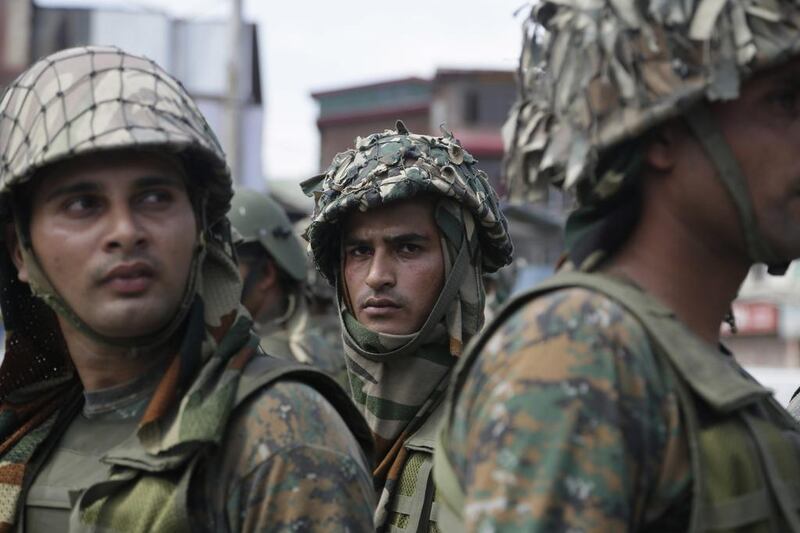As India and Pakistan celebrate their 70th independence days this week, a war of words has, once again, escalated between the two countries. And, as usual, Kashmir is the focal point. But this time India has changed the terms of discourse dramatically.
Prime minister Narendra Modi has made it clear that while his government was willing to talk to anyone with an open mind and was keen to normalise the situation, there would be no major concessions in dealing with the protests in Kashmir.
Strongly rejecting Pakistan’s bid to present itself as an involved party, Mr Modi claimed that Islamabad’s own human rights record did not give it such leeway. He has also suggested that there was a need to track persons who had fled Pakistani Kashmir so that their accounts could be publicised. Pakistani Kashmir, he has said, is part of India’s Jammu and Kashmir.
The Modi government is also keen to bring attention to Balochistan, saying that Islamabad is meddling in that restive area.
In his address this month to the South Asian Association for Regional Cooperation (SAARC) home ministers conference in Islamabad, Indian home minister Rajnath Singh raised the issue of Pakistani support for extremist groups on foreign soil. He argued: “One country’s terrorist cannot be a martyr or freedom fighter for anyone. I also speak for the entire humanity – not just for India or other SAARC members – in urging that in no circumstances should terrorists be eulogised as martyrs.”It was a reference to the Pakistani government declaration of July 19 as a “black day” in memory of a Hizbul Mujahideen commander Burhan Muzaffar Wani, who was killed by the Indian army in Kashmir on July 8.
Pakistan’s prime minister, Nawaz Sharif, declared at a rally that he was waiting for the day that Kashmir becomes a part of Pakistan. Indian external affairs minister Sushma Swaraj promptly hit back, accusing Mr Sharif of advancing the “despicable design” of destabilising South Asia by exporting “dirty money and dangerous terrorists”. There has already been a face-off at the United Nations. Slamming Pakistan for raising the killing of Wani at the international forum, India claimed that Pakistan extolled the “virtues” of terrorism as a state policy towards the “misguided end” of coveting the territory of others.
India’s ambassador to the United Nations, Syed Akbaruddin, was responding to the remarks made by Pakistan’s envoy Maliha Lodhi during a debate on human rights in the General Assembly. In her statement, Ms Lodhi called the killing of Wani as “extrajudicial”. She described Wani as a “Kashmiri leader”.
Other senior Pakistani officials have been outspoken on the issue. Mr Sharif’s adviser on foreign affairs, Sartaj Aziz, has said that “India cannot suppress the voice of Kashmiris who are struggling for their just right of self-determination by using brutal force and committing human rights violations”.
Indian security forces have been countering protests in Kashmir since Wani’s death. More than 50 people have been killed and more than 5,000 wounded, including members of the security forces. Between the curfew imposed by the government and calls for a shutdown by separatist leaders, normal life remains paralysed.
The Indian government has taken steps to ensure a return to normality in Kashmir, but it has taken a strong stand against what it sees as Pakistan’s role in the ongoing tensions in the region.
Mr Singh recently accused Islamabad of appealing to Kashmiri youth to take up arms against India.
It is clear that no Indian government is willing to allow Kashmir’s secession for fear of encouraging secessionist movements elsewhere. India’s democracy and secularism would receive a body blow if it accepted the idea that a state should secede just because it has a Muslim majority.
In this light, if there has been any success in the India-Pakistan peace process in the past few years, it has been a recognition on both sides that territorial changes are strictly out of the question.Moreover, there would be broader geopolitical ramifications of an independent Kashmir, as it would remain dependent on the kindness of its neighbours. India, Pakistan and even China would try to enhance their own strategic interests in an independent Kashmir.
It is not readily evident that an independent Kashmir would be any less of a bone of contention between India and Pakistan as the present state of affairs. Extremism would get a boost and India would find it difficult to manage growing tensions between Hindu and Islamic extremists. It would be no exaggeration to suggest that this would be the end of India as the world has come to know it.
Indo-Pakistani relations, which under Mr Modi and Mr Sharif had once seemed on the mend, have regressed to the point where verbal tit-for-tat is the new normal.It is, of course, the ordinary Kashmiris who lose in all of this as they find themselves unable to emerge from the grip of violence.
Harsh V Pant is a professor of international relations at King’s College London





